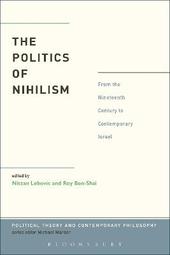
|
The Politics of Nihilism: From the Nineteenth Century to Contemporary Israel
Hardback
Main Details
Description
Contemporary politics is faced, on the one hand, with political stagnation and lack of a progressive vision on the side of formal, institutional politics, and, on the other, with various social movements that venture to challenge modern understandings of representation, participation,and democracy. Interestingly, both institutional and anti-institutional sides of this antagonism tend to accuse each other of "nihilism", namely, of mere oppositional destructiveness and failure to offer a constructive, positive alternative to the status quo. Nihilism seems, then, all engulfing. In order to better understand this political situation and ourselves within it,The Politics of Nihilism proposes a thorough theoretical examination of the concept of nihilism and its historical development followed by critical studies of Israeli politics and culture. The authors show that, rather than a mark of mutual opposition and despair, nihilism is a fruitful category for tracing and exploring the limits of political critique, rendering them less rigid and opening up a space of potentiality for thought, action, and creation.
Author Biography
Nitzan Lebovic is the Apter Chair of Holocaust Studies and Ethical Values at Lehigh University (PA). Roy Ben-Shai is a Mellon Post-Doctoral Fellow and Visiting Assistant Professor of Peace, Justice and Human Rights at Haverford College (PA).
ReviewsThis original and challenging volume traces the development of the concept of nihilism from a stunning variety of perspectives and theoretical positions. Combining precision, erudition and intellectual commitment, The Politics of Nihilism makes a convincing case for a view of nihilism as a vital force in a political constellation increasingly hostile to dissonant voices. A lucidly argued and greatly enriching book for anyone interested in the past, present and future of radical political critique. * Vivian Liska, Professor of German Literature, University of Antwerp, Belgium * The Politics of Nihilism is a major contribution to critical studies, and a necessary book for anyone interested in the meaning and history of nihilism and its political relevance in our time. * Simon Critchley, Hans Jonas Professor, New School for Social Research, US. * Can a democratic and liberal politics not be nihilist-and be radically neutral with respect to the choice of values? This book is the result of a seminal work done by a group of Israeli intellectuals and philosophers who are sensible to the problem of equality of citizens in a society that, in as much as it does not accept in principle the polytheism of values to which nihilism leads, is also threatened by an internal revolt that often has wanted to claim equality through the use of the nihilistic weapon of suicide terrorism. Precisely these reasons give birth to the contemporary relevance of the topic in Israel, which is analyzed in these collected essays-with extreme critical balance and secular spirit-as much in its theoretical self-contradictions as in its ethical implications. But apart from the specific problem of the state of Israel as a "Jewish state," which is based upon the acceptance of a religious faith, the question of political nihilism has a general dimension, because it concerns all democratic societies that are continually confronted with the problem of finding a solid rational basis for the laws of their communities. * Gianni Vattimo, Emeritus Professor of Philosophy, University of Turin, Italy *
|